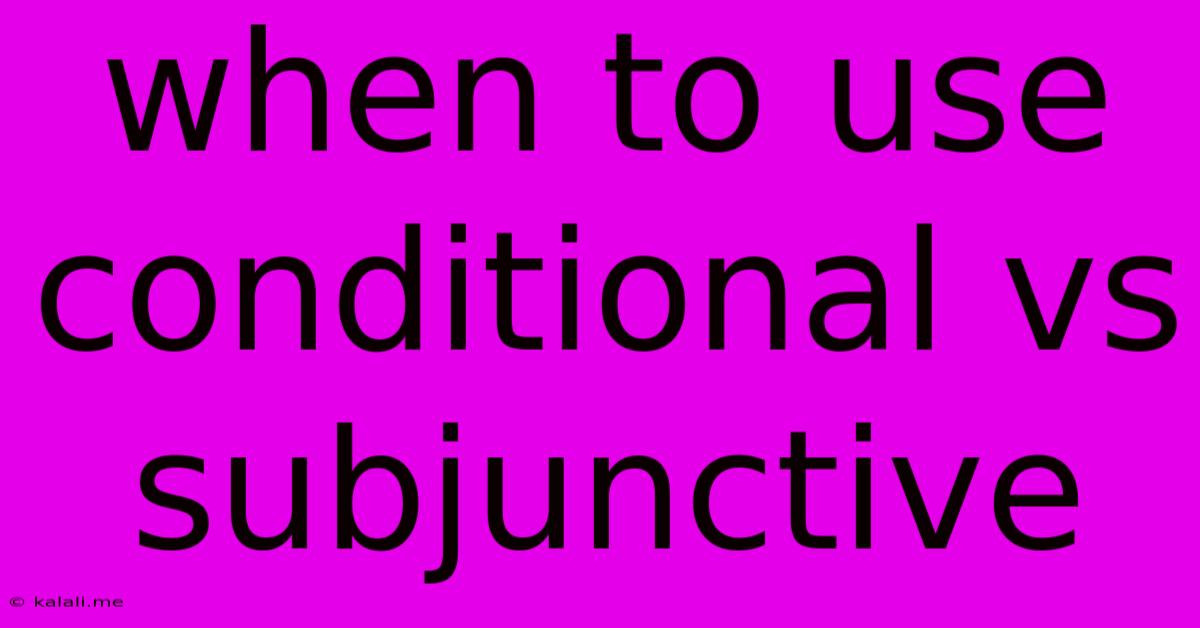When To Use Conditional Vs Subjunctive
Kalali
Jun 06, 2025 · 3 min read

Table of Contents
When to Use Conditional vs. Subjunctive: A Clear Guide
Understanding the difference between conditional and subjunctive moods can be tricky, even for native English speakers. Both express hypothetical situations, but they do so in distinct ways, signifying different levels of possibility and formality. This article will clarify the nuances of each mood, providing clear examples to help you master their usage.
What is the Conditional Mood?
The conditional mood expresses hypothetical situations or possibilities that depend on a certain condition being met. It often uses auxiliary verbs like "would," "could," "should," and "might." There are several types of conditional sentences, each expressing a different degree of likelihood:
Types of Conditional Sentences:
-
Zero Conditional (Fact): This describes a general truth or a result that always happens when a certain condition is met. It uses the simple present tense in both clauses.
- Example: If you heat water to 100 degrees Celsius, it boils.
-
First Conditional (Real Possibility): This describes a likely future event that depends on a certain condition. It uses the simple present tense in the "if" clause and "will," "can," or "may" in the main clause.
- Example: If it rains tomorrow, I will stay home.
-
Second Conditional (Hypothetical Possibility): This describes an unlikely or imaginary situation in the present or future. It uses the simple past tense in the "if" clause and "would," "could," or "might" in the main clause.
- Example: If I won the lottery, I would travel the world.
-
Third Conditional (Unreal Past): This describes a hypothetical situation that is contrary to fact in the past. It uses the past perfect tense in the "if" clause and "would have," "could have," or "might have" in the main clause.
- Example: If I had studied harder, I would have passed the exam.
What is the Subjunctive Mood?
The subjunctive mood expresses wishes, suggestions, demands, or hypothetical situations that are less likely or contrary to fact than those expressed by the conditional mood. It often involves verbs like "suggest," "demand," "recommend," "request," "insist," and "propose." The subjunctive is more formal and less common in everyday speech than the conditional.
Key Differences and When to Use Each:
The main difference lies in the degree of likelihood and formality. Conditional sentences express possibilities, ranging from highly likely to entirely unrealistic, while the subjunctive focuses on desires, suggestions, or hypothetical situations often viewed as less probable or even impossible.
-
Use the conditional when: You're discussing possibilities, probabilities, or hypothetical situations within the realm of possibility, even if unlikely. Focus on the outcome contingent on the condition.
-
Use the subjunctive when: You're expressing a wish, demand, suggestion, or hypothetical situation that is less likely or contrary to fact, emphasizing the speaker's attitude or the inherent improbability of the event. The focus is less on the outcome and more on the speaker's wish or suggestion.
Examples Highlighting the Difference:
-
Conditional: If I study hard, I will pass the exam (likely).
-
Subjunctive: It is essential that he study hard (suggestion/demand).
-
Conditional: If I were rich, I would travel the world (hypothetical but conceivable).
-
Subjunctive: I wish I were rich (contrary to fact/wishful thinking).
In Summary:
While both conditional and subjunctive moods deal with hypothetical situations, they differ in their focus and level of formality. The conditional focuses on the outcome based on a condition, while the subjunctive expresses wishes, demands, or suggestions, often emphasizing the improbability or contrary-to-fact nature of the situation. Understanding these distinctions will enhance your writing precision and sophistication.
Latest Posts
Latest Posts
-
How To Stop Rust On Car
Jun 06, 2025
-
How High To Mount Towel Bar
Jun 06, 2025
-
Can You Blow Out Shabbat Candles
Jun 06, 2025
-
How To Change Ai Teammates Loadout Ready Or Not
Jun 06, 2025
-
Minecraft Make Days Longer Server Command
Jun 06, 2025
Related Post
Thank you for visiting our website which covers about When To Use Conditional Vs Subjunctive . We hope the information provided has been useful to you. Feel free to contact us if you have any questions or need further assistance. See you next time and don't miss to bookmark.